 | « Back to article | Print this article |
'I went away from the industry because all the people I enjoyed working with, like Manmohan Desai and Prakash Mehra, are no more.'
'They left this world and went away, so I lost interest in my work.'
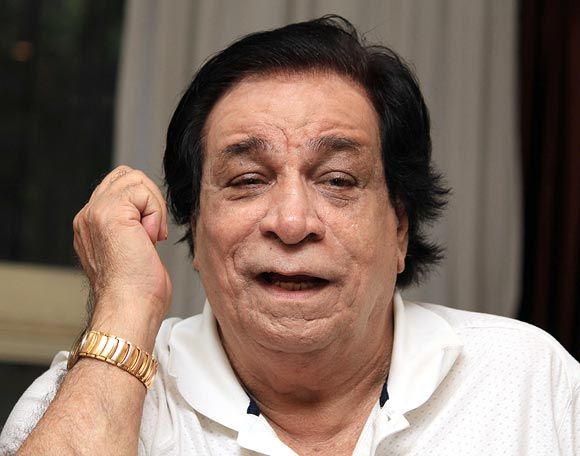
Kader Khan, 81, passed into the ages on December 31 in Canada after suffering from a rare and prolonged illness.
Kader Khan contributed so much to the Hindi film industry as an actor, writer and producer in his nearly five decade long career. We remember the legend with this eloquent interview, first published on Rediff.comin 2012.
There was a time when it was impossible to miss Kader Khan. The man, it seemed, was omnipresent. Every second film either seemed to feature him in a prominent supporting role or was written by him.
Khan has been around for far longer than many of us can imagine. He wrote the screenplay for movies such as Khoon Pasinaand Laawaris with Prakash Mehra, and gave hit after hit with Manmohan Desai with films like Parvarish, Dharam Veer, Suhaag, Amar Akbar Anthony, Naseeb, Coolie and Desh Premee.
The screenwriter-turned-actor probably reached the pinnacle of his career with his 'No 1' series of films that starred Govinda in lead roles -- Hero No 1 and Coolie No 1 are perhaps the best-known films in this series.
Then, mysteriously, he disappeared.
For the longest time, no one seemed to know where he was and what he was doing.
In a world of fly-by-night films and heroes, no one seemed to have the time for a yesteryear character actor.
Not very long ago, we read about Khan's son Sarfaraz's debut in Bollywood. And, just like that, Kadar Khan came out of hiding.
When Patcy N/Rediff.com met him, Kader Khan was a shadow of the energetic actor he had been in the eighties and nineties. He was in bed, dressed in a pair of simple track pants and a tee shirt. His movements were restricted because of a recent knee surgery and he requested me to keep the interview short.
That 'short' interview went on for over an hour.
With each passing minute, Kader Khan revealed a little more of himself, coming across as a soft-spoken and wonderful person, full of insights and anecdotes that left Patcy in splits.
Why Kader Khan left the industry
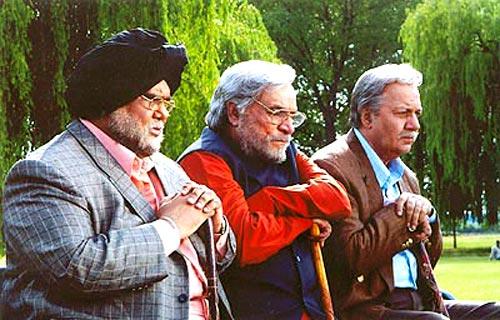
I was studying Arabic and Urdu. I want to start a Hindi and Urdu institution. People say that Muslims don't understand their religion properly and, without understanding anything, they practise Islam.
Like Hindu religious texts are in Sanskrit, Islamic texts are in Arabic.
Therefore, it is necessary for Muslims to understand Arabic if they want to learn about and understand their religion.
My father was a priest and scholar of Islam; this is his gift to me. He had asked me to work on this. I have translated many books from other languages into Arabic.
I have started a syllabus right from kindergarten and I am aiming to do it up to post-graduation.
I will start this institution in Dubai first. Then I will go to Canada and, after that, Mumbai.
I went away from the industry because all the people I enjoyed working with, like Manmohan Desai and Prakash Mehra, are no more.
They were institutions; they were my teachers and my students.
They taught me a few things and learnt a few things from me.
They left this world and went away, so I lost interest in my work.
Yes, after that, I worked for few more years with David Dhawan and Govinda, but I loved writing and slowly, it was taken away from me.
Till the time I worked, I was writing my own dialogues. I would even correct Govinda's dialogue.
But writing the whole script gives you more satisfaction.
That's why I left the industry.
Early days

When I was a kid, whatever I saw during the day, I would enact it in the evening.
When I returned from namaz in the evening, I would stop at a Jewish graveyard near my house and enact it all.
I wasn't aware of anyone watching me until, one day, somebody shone a torch on me.
His name was Ashraf Khan and he was a very famous actor who had acted in Mehboob Khan's Roti.
He asked me what I was doing and I told him that whatever I heard and liked during the day, I try to imitate it.
He asked me whether I would like to work in 'drama.'
I was just 10 and I did not know what drama was. He asked me to come the next day to his bungalow.
When I went there, he gave me a page of dialogue and asked me read it aloud.
He liked the way I read it; he was so pleased that he gave me three more pages to read and ultimately cast me in his play.
I belonged to a very poor family, but I got the role of a prince.
In those days, plays were held in film theatres which had a small stage in front.
Everybody loved me; one old man gave me Rs 100.
Association with Dilip Kumar
After that, I studied and acted in plays at the same time.
I graduated in civil engineering.
I never thought about doing films -- it just happened.
I was in this play, Taash Ke Patey. Comedian Aghasaab saw the play and told Dilip Kumar that he should see the play, which was written and directed by Kader Khan.
I got a phone call from Dilip Kumar.
I asked who is speaking, and the person on other end said, "Main Yusuf Khan bol raha hoon."
I said, "Kaun Yusuf Khan?"?
He said, "Log jisse Dilip Kumar ke naam se jaante hai."
The phone slipped from my hand and I fell down!
He saw the play and he loved it so much that he came on stage and said, 'I am lucky that Kader Khan invited me to see the play. I never knew there were so many good stage artistes. All of them should be given a break in the film industry. But, for the time being, I will give Kader Khan a role in my next film Sagina Mahato, the shooting for which starts tomorrow. After a week, my other film Bairaag will start; I will give him an important role in that too.'
That's how my film acting career started.
Dilip Kumar acted in one film a year so I was doing very little film work.
I was also teaching civil engineering in college (the M H Saboo Siddik College of Engineering in Byculla, south central Mumbai).
His first film as a writer, Jawaani Diwaani
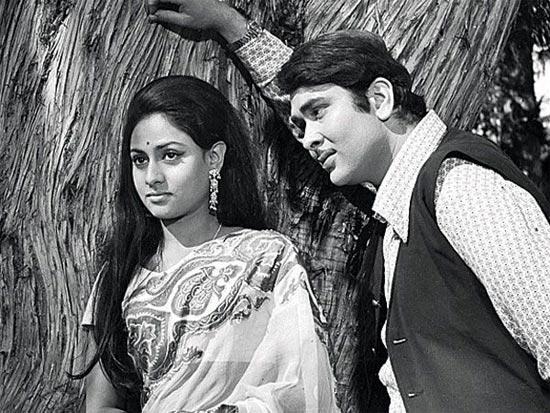
My next play, Local Train, got an award and I got prize money of Rs 1,500.
My salary in those days was Rs 350.
The guest at the awards ceremony offered to let me write the dialogues for a film he was starting, Jawaani Diwaani.
I told him I don't know how to write film dialogue. He told me to write the way I write and that's how my writing career in films started.
I was paid Rs 1,500 for the dialogues.
People liked my work, I started getting famous and people liked the way I delivered my dialogues.
My students in college demanded to know why I wasn't teaching any more.
I told them the film work gets over late, at 11 pm. They insisted I teach after that, so I used to go to the college at midnight and all my 150 students would be waiting for me.
They would make tea for me, apply balm on my head and, after tying a cloth on my head, I would start teaching.
I taught mathematics, geometrical machine drawing, applied mechanics, theory of structure, strength and mechanics.
I taught them for three months and all my 150 students passed with first class. I want to add this in a film scene some day to inspire the teachers and students of today.
After finishing the shooting of Jawaani Diwaani, I was walking out one day when a car stopped near me.
A man got down and asked me to do a film for him. I told him I got Rs 1,500 for Jawaani Diwaani and, anyway, I have to teach my students.
The man gave me an envelope which was so heavy that I went to one side and opened it. It contained Rs 21,000!
I went mad.
The man was Ravi Malhotra, producer of Khel Khel Mein.
His association with Manmohan Desai
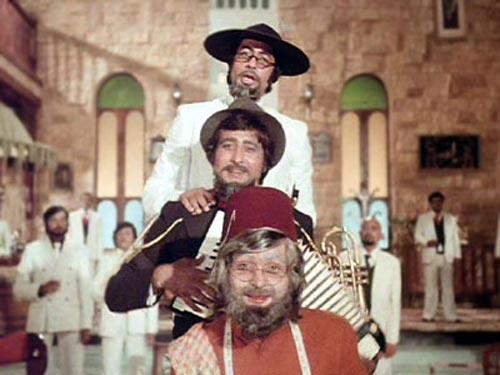
After that, I met Ebrahim Nadiadwala who signed me to write the dialogues for Rafoo Chakkar.
Then I met Manmohan Desai.
He was fed up with Muslims.
He said, "You people are so good in Urdu, but you don't know how to use it well other than doing sher-o-shayari."
He told me we should be writing more dialogues.
He asked me to write dialogues for his film, but warned me that if the dialogues were not good, he would tear it up and throw it into the gutter.
"What if I wrote good dialogues?" I asked him.
He said, "I will pick you up and put you on my head like a Ganpati and dance."
I went to his house the next day.
He was playing cricket with the kids from his area which he did every day.
He saw me from afar and murmured something.
I went up to him and asked why he said bad things about me.
He said, "I did not."
I told him, "Sir, I know how to lip read; didn't you just say ullu ke patte ko samjhme nahi aaya phir aagaya poochne ke liye?"
He used this scene in Naseeb, where the heroine lip reads what the villains are saying through binoculars.
He also gave me credit for the scene.
But, to continue with the story, he took me in and heard the dialogues.
He was so happy with them that he made me read it over and over again at least 12 times and even recorded it.
He then went inside, got a portable black and white Toshiba television set and gifted it to me together with a gold bracelet. He also gave me Rs 20,000 in cash.
After giving all that, he asked me my price.
I told him that I got Rs 21,000 for my last film.
He said, "For my film, you will get Rs 120,000."
I got all this for writing the dialogues for Roti.
After that, there was no looking back.
I was getting film after film to write.
I became famous and I was respected.
His association with Prakash Mehra
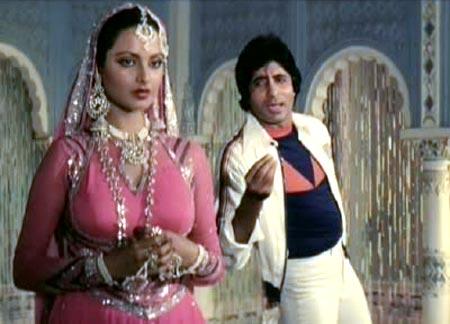
My first meeting with Prakash Mehra was very different.
I was teaching in Saboo Siddik and he was shooting Haseena Man Jayegi in the college.
He was not happy with some of his dialogues, so he pulled me out from my lecture and asked whether I could fix the lines.
He was pleased with what I did and said it sounded like a proper film dialogue.
I had not yet started writing for films then.
I met him again by chance at a film studio.
My first film for him was Khoon Pasina.
After that, I wrote Lawaaris and Muqaddar Ka Sikander.
His tiff with Amitabh Bachchan
My association with Amitabh Bachchan started with Khoon Pasina and Manmohan Desai's Parvarish. We still speak on the phone once in a while.
But, in between, our relations had soured.
I don't want to say much about why that happened.
I had told him not to enter politics, but that is a different story.
After he renounced politics, his behaviour changed.
I always called him Amit, but, one day, when I called him Amit, it did not go down well with him.
One of the producers from the south asked me, "Aap sirji ko mila?"
I asked "Kaun sirji?"
He was shocked and said, "Sirji tumko nahi maloom? Amitabh Bachchan."
I told him, "I call him Amit, he is a friend."
He said, "Nahi. Aap usse hamesha sirji bolna, Amit nahi bolna abhi, he is a big man."
Amitabh was approaching us and he thought like all the others I would call him 'Sirji', which I did not.
From that day, I never called out to him and he never spoke to me.
After that, I went south to do films and mostly wrote the dialogues of the south remakes that Jeetendra did.
Why he gave up doing villain roles
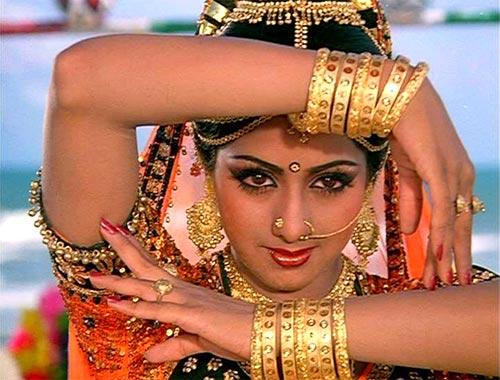
My elder son Kudroos would come home after playing with his friends with his clothes all torn.
As a villain, I always got beaten up in the end.
His friends and classmates told him that your father beats up people and then, in the end, he gets beaten up.
My son used to get angry at such comments and get into fights.
One day, when he came home with a head injury, I became very upset and decided I would not accept villain roles any more.
Himmatwala, a comedy, was being made and I started doing comic roles from then on.
His association with NTR
After NTR became the chief minister of Andhra Pradesh, he called me and said he wanted to give me some responsibility.
In those days, all film work happened mostly in Madras (now Chennai).
Even for films shot in Mumbai, the post-production work was done in Madras.
NTR told me that most of the producers from Andhra do their film work in Madras, so could I tell them that he would give them a place at a cheaper rate to build their own studio in Andhra.
I knew most of the producers because I was working in most of the south remakes for which I wrote the dialogues.
I spoke to the producers and they all agreed, and so two different industries were formed -- Tamil and Telugu -- and a studio was built in Hyderabad.
His association with Govinda and David Dhawan
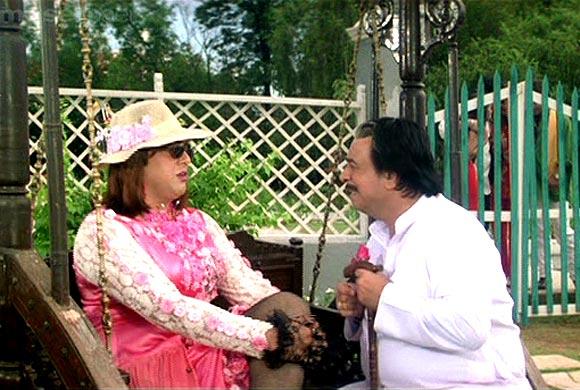
When I worked with Manmohan Desai and Prakash Mehra, their stories were different and thus, dialogues were different.
With David Dhawan, his stories were completely different, mostly slapstick comedy.
I did all the 'No 1' series with Govinda.
But, here, I was mostly acting in their films; I did not write the dialogues.
Rumi Jaffery was writing dialogues.
I just wrote my dialogues and Govinda's, but there is a difference in writing a whole script and writing dialogues of just two characters.
Still, I continued working with David and Govinda.
I started with Aankhen to Haseena Man Jayegi and Gharwali Baharwali.
My last movie with them was Coolie No 1.
I did not write double meaning or vulgar dialogues. I had stopped writing by then.
Govinda is a very good actor.
With him, my comic timing has improved. Govinda became a good actor because he had the desire to learn.
His sons...
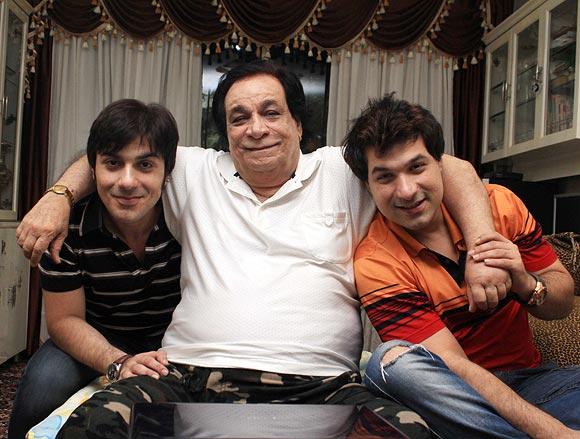
My sons revived my drama group, formed when I was in college. It was called Kal Ke Kalaakaar; some also called it Kader Ke Kalaakar.
My sons are reviving my plays, Local Train and Humare Bhi Hai Mehrba Kehte Kehte, which is a satire on the municipal corporation and corporators.
I am not writing and directing; now, my sons are taking the flag forward.
After a while, I will act in my play Taash Ke Patte.
If there is a good film, I will act in that too.
I am getting film offers, but I do not like them.
I got both my knees operated on, so I find it difficult to walk. I will start with the play and, after that, I will act in and direct films.
I would love to direct a film. In fact, I have directed portions of films. I directed a portion in Yaarana; the song Saara Zamana is directed by me.
I also directed the scene in Amar Akbar Anthony where Amitabh tries to stick a bandaid on the mirror.
I have learnt a lot from Amitabh, just as he has learnt from me. We helped each other.
Amitabh and Jeetendra are the two most punctual people in this industry. They have never made any producer wait for even 10 minutes.
